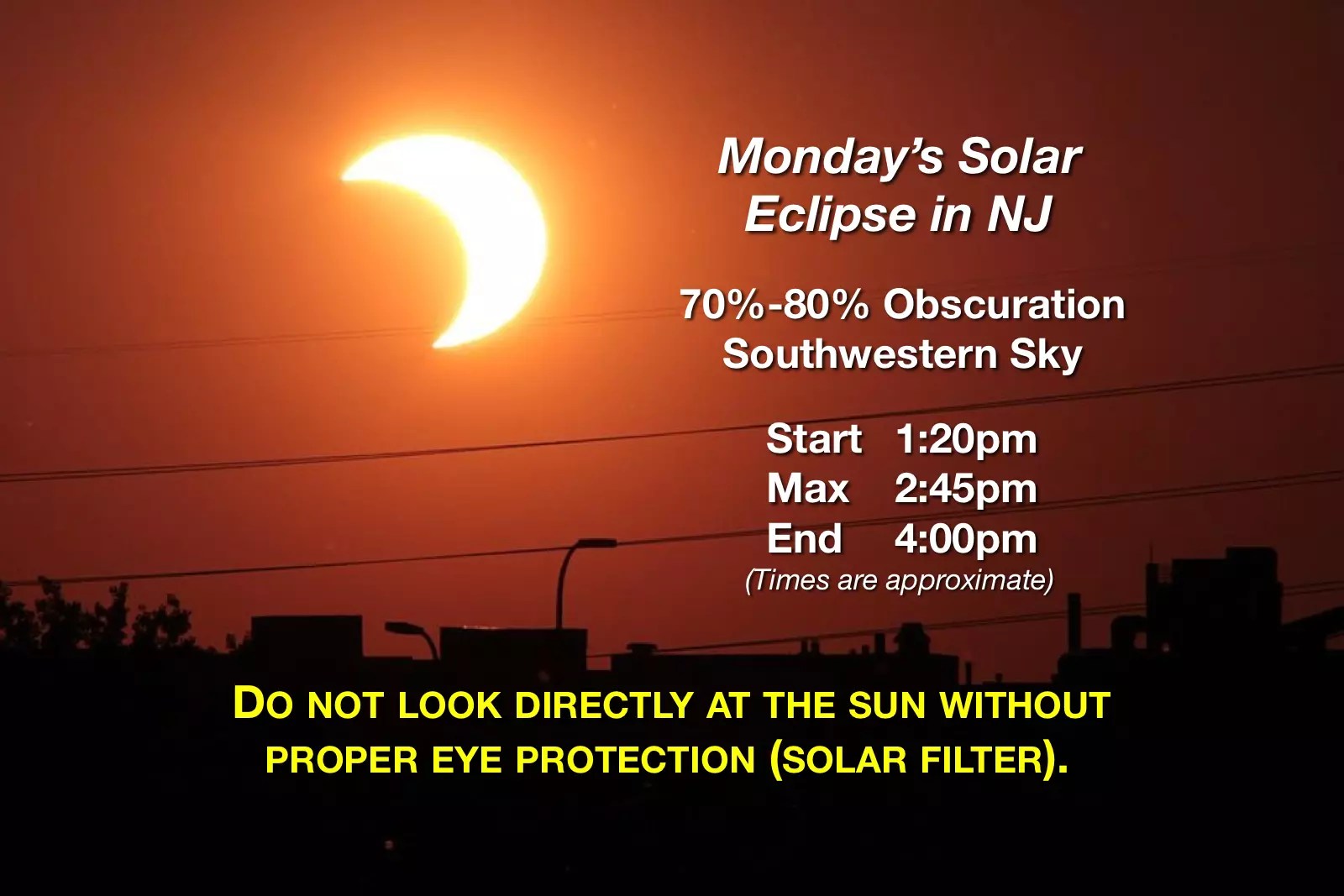The solar eclipse is a breathtaking event that captivates skywatchers and astronomy enthusiasts alike. In New Jersey, the excitement builds as the time approaches for this celestial phenomenon. Understanding the solar eclipse time in NJ is crucial for anyone wanting to experience this awe-inspiring sight. Solar eclipses occur when the Moon passes between the Earth and the Sun, blocking the Sun's light either partially or totally. This article will guide you through everything you need to know about solar eclipses in New Jersey, including viewing times, historical significance, and tips for safe viewing.
From the science behind the eclipse to the best locations for viewing, we will explore the essential details that everyone should know. This event not only provides a unique opportunity to witness the wonders of our solar system but also serves as a reminder of the intricate dance between celestial bodies. The next solar eclipse offers a chance to connect with nature and experience a remarkable moment in time.
Whether you're a seasoned eclipse chaser or a casual observer, this comprehensive guide will equip you with knowledge and insights to make the most of your solar eclipse experience in New Jersey. So, prepare your viewing glasses and mark your calendars; an extraordinary event is on the horizon!
Table of Contents
- What is a Solar Eclipse?
- Types of Solar Eclipses
- Solar Eclipse Time in NJ
- Best Places to View the Eclipse in NJ
- How to Safely View a Solar Eclipse
- Historical Significance of Solar Eclipses
- Preparing for the Eclipse
- Conclusion
What is a Solar Eclipse?
A solar eclipse is an astronomical event that occurs when the Moon moves between the Earth and the Sun. This alignment results in the Moon casting a shadow on the Earth, temporarily blocking sunlight. Solar eclipses can be classified into three main types: total, partial, and annular.
Types of Solar Eclipses
- Total Solar Eclipse: The Moon completely covers the Sun, resulting in darkness during the day.
- Partial Solar Eclipse: Only a portion of the Sun is obscured by the Moon.
- Annular Solar Eclipse: The Moon is too far from the Earth to completely cover the Sun, leaving a ring-like appearance.
Solar Eclipse Time in NJ
New Jersey will experience a significant solar eclipse on April 8, 2024, when a total solar eclipse will be visible across parts of the state. The exact time of the eclipse will vary depending on your location within New Jersey. Here are the estimated times for the major cities:
| City | Start Time | Maximum Eclipse | End Time |
|---|---|---|---|
| Trenton | 2:15 PM EDT | 3:26 PM EDT | 4:37 PM EDT |
| Newark | 2:15 PM EDT | 3:27 PM EDT | 4:38 PM EDT |
| Atlantic City | 2:14 PM EDT | 3:25 PM EDT | 4:36 PM EDT |
Make sure to arrive at your chosen viewing location early to secure a spot and enjoy the pre-eclipse atmosphere.
Best Places to View the Eclipse in NJ
Choosing the right location to witness the solar eclipse can enhance your experience significantly. Here are some of the best spots in New Jersey for viewing the eclipse:
- Liberty State Park: Offers a clear view of the skyline and plenty of open space.
- High Point State Park: The highest point in NJ provides an excellent vantage point.
- Delaware Water Gap: A beautiful natural setting for skywatching.
- Local Planetariums or Observatories: Check for organized viewing events.
How to Safely View a Solar Eclipse
Viewing a solar eclipse safely is essential to protect your eyesight. Here are some tips on how to do it:
- Always use proper solar viewing glasses or eclipse viewers.
- Avoid looking directly at the Sun without protection, even during a partial eclipse.
- Use a pinhole projector or other indirect viewing methods.
Historical Significance of Solar Eclipses
Solar eclipses have fascinated humanity for centuries and have played a significant role in various cultures. They have been viewed as omens, symbols of gods' displeasure, and opportunities for scientific discovery. Notable historical eclipses, such as the one in 1919 that helped prove Einstein's theory of relativity, underscore their importance in the advancement of science.
Preparing for the Eclipse
To make the most of your solar eclipse experience, preparation is key. Here are a few steps to consider:
- Gather necessary viewing equipment, including solar glasses and cameras.
- Plan your travel route to your chosen viewing location.
- Check weather forecasts to ensure clear skies on the day of the eclipse.
Conclusion
The solar eclipse time in NJ presents an extraordinary opportunity to witness the wonders of the universe. By understanding the event's significance, preparing appropriately, and choosing the right viewing location, you can create lasting memories. Mark your calendar for April 8, 2024, and get ready for an unforgettable experience. Don’t forget to share your thoughts in the comments below or explore more articles on our site!
As we anticipate this celestial event, we encourage you to stay informed and engaged with the world around you. The universe has so much to offer, and the solar eclipse is just one of its many wonders!
- Carol Luistro Obituary
- Sophie Rain Naked
- Did Kamala Harris Used To Date Montel Williams
- Molly Roloff Kids
- Heather Robinson Tim Robinson
- Porn Camilla Araujo
- Brandon Steven Net Worth Forbes
- Jessica Dube Accident
- Sophie Rain Spiderman Erome
- Yololary Onlyfans


